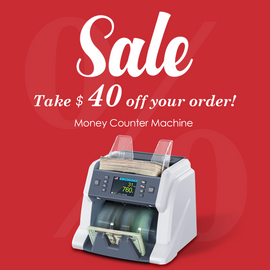In today's business environment, although electronic payment methods are becoming increasingly prevalent, many businesses still need to handle a large volume of cash transactions. Cash handling often involves many cumbersome processes, but using a money counter can significantly improve efficiency and reduce errors. This article will detail these cash handling processes and explain how money counters can play a role.
Cash Handling Processes and the Role of Money Counters
Below are the main cash handling processes and how money counters can simplify them:
| Cash Handling Process | Details | Money Counter Simplification |
|---|---|---|
| Close Drawer | Cashiers or managers need to spend time using POS or cash register tools to count and reconcile cash. | Money counters can quickly and accurately count cash, reducing the time spent counting and reconciling. |
| Start/Rebuild Drawer | Opening the drawer from the initial deposit to prepare for the next cashier. | Money counters can quickly count the deposits, ensuring accuracy and saving preparation time. |
| Prepare/Coordinate Deposits | Costs associated with preparing or coordinating deposits. | Money counters can help quickly count and verify deposit amounts, reducing the time and effort needed to prepare deposits. |
| Pickups | During a shift, pickups for too much cash in the drawer or large denomination bills. | Not applicable |
| Change Orders | Cost associated with a cashier requiring change throughout the shift. | Not applicable |
| CIT/Deposit Costs | Costs of Cash In Transit (armored trucks) or cost of employees to go to the bank to make the deposit. | Not applicable |
| Cash Shrink | Loss due to theft, fraud, or other cash loss activities. | Money counters can detect counterfeit bills, effectively preventing fraud and can even record serial numbers. |
| Bank Charges | Bank statement fees, reconciliation fees, cash value fees, and change order fees. | Bank tellers can use money counters to help quickly reconcile accounts. |
| Audits/Discrepancies | Costs of redoing counts, auditing tills, and time associated with recounts for discrepancies. | Money counters can improve the accuracy of counting and reconciling cash, reducing the need for recounts and audits due to errors. |
| Daily Cash Balancing | Balancing daily cash inflows and outflows to ensure that recorded amounts match actual cash on hand. | Money counters can quickly count daily cash, ensuring accuracy and reducing end-of-day settlement time. |
Advantages of Money Counters
As shown in the table above, money counters can significantly simplify several cash handling processes and reduce human errors, improving efficiency:
- Speeding Up Counting: Money counters can quickly and accurately count large volumes of mixed denomination bills, significantly reducing counting time.
- Improving Accuracy: Money counters reduce human counting errors, ensuring that each count is accurate.
- Simplifying Reconciliation and Audits: The use of money counters can increase the efficiency of reconciliation and audits, reducing the need for repeated work due to discrepancies.
- Preventing Counterfeit Fraud: Money counters can detect counterfeit bills, reducing losses caused by fake currency.
As the gears of commerce continue to turn at an ever-faster pace, the need for streamlined cash management becomes more apparent. Ribao Technology understands this need and is dedicated to equipping businesses with the tools necessary to thrive in today's competitive landscape.
Take the first step towards optimized cash management. Visit Ribao Technology today and let us help you future-proof your business operations.







